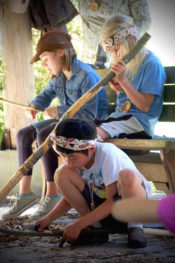
 Waldorf-inspired Homeschool Curriculum
Waldorf-inspired Homeschool Curriculum The Journey is Everything
The Journey is Everything Everything a Teacher Needs
Everything a Teacher Needs Transforming Voices Worldwide
Transforming Voices Worldwide Jamie York Books, Resources, Workshops
Jamie York Books, Resources, Workshops Train to Teach in Seattle
Train to Teach in Seattle Summer Programs - Culminating Class Trips
Summer Programs - Culminating Class Trips ~ Ensoul Your World With Color ~
~ Ensoul Your World With Color ~ Association for a Healing Education
Association for a Healing Education Immersive Academics and Arts
Immersive Academics and Arts Full-Time Teacher Education
Full-Time Teacher Education Caring for All Stages of Life
Caring for All Stages of Life Quality Education in the Heartland
Quality Education in the Heartland Flexible preparation for your new grade
Flexible preparation for your new grade Waldorf Training in Australia
Waldorf Training in Australia Roadmap to Literacy Books & Courses
Roadmap to Literacy Books & Courses Middle School Science With Roberto Trostli
Middle School Science With Roberto Trostli Bay Area Teacher Training
Bay Area Teacher Training Apply Today: New Cohort Starts Nov. 2025
Apply Today: New Cohort Starts Nov. 2025 Space speaks. Its language is movement.
Space speaks. Its language is movement. Bringing Love to Learning for a Lifetime
Bringing Love to Learning for a Lifetime Great books for Waldorf Teachers & Families
Great books for Waldorf Teachers & Families
Would you like to become a sponsor?
Waldorf News

Sherry Turkle: ‘I am not anti-technology, I am pro-conversation’
February 7, 2017
For nearly 30 years now, Sherry Turkle, professor of social psychology at the Massachusetts Institute of Technology, has been exploring the effects of digital worlds on human behaviour. Her books, Life on the Screen, The Second Self and Alone Together, have charted the seductions of “intimate machines”, the advance of social media and virtual realities and the all-pervasive internet, and the effect these things have had on our culture and our lives. Her latest book, Reclaiming Conversation: The Power of Talk in the Digital Age, is a call to arms to arrest what she sees as the damaging consequences of never being far from email or text or Twitter or Facebook, in particular the impact it has on family life, on education, on romance and on the possibilities of solitude. Using extensive interviews and half a lifetime of research, she suggests – with reference to the birth of the environmental movement in the 1960s – that we are at a “Silent Spring” moment in our infatuation with life on screens rather than life in the real world, never wholly in one or the other. She measures these effects in a breakdown of empathy between children, in the consequences of increasingly distracted family interaction and a growing need for constant stimulus. Her antidote is a simple one: we need to talk more to each other. More »

Cultivating Connections to the Past and the Land at Whidbey Island Waldorf School
January 28, 2017
An annual “potlatch,” hosted each May by the Whidbey Island Waldorf School in Clinton, WA brings indigenous traditions to life when students meet and learn from Native American elders. The potlatch is a traditional, ceremonial gift-giving feast practiced by indigenous peoples of the Pacific Northwest Coast. Europeans used the word potlatch to refer to the Nootkan word p’alshit’ which means “to give.” Northwest coastal tribes hold potlatches each year to share their wealth, feast, dance and tell stories. Coastal tribes include Haida, Nuxalk, Tlingit, Tsimshian, Nuu-chah-nulth (Nootka), Kwakwaka’wakw (Kwakiutl), and Coast Salish. Their region extends from the coast of Alaska to British Columbia and Washington. Honoring the tradition of our coastal Native Americans, WIWS teacher Angela Lindstrom directs and hosts the event each year for fourth grade students in Waldorf schools from Bellingham to Olympia. A teacher at the Whidbey Island Waldorf School, her cultural background includes Ojibwa and Cherokee ancestry. Over the years Lindstrom has cultivated a cadre of Native American elders who teach skills and traditions that leave the students awed in the end. More »

Ken Robinson: 'You don't want a caste system for creativity' -
January 20, 2017
When Gillian Lynne was eight years old, her school said she might have a learning disorder because she would not sit still. Her mother took her to see a specialist. During the meeting, the specialist asked to speak to her mother privately, and left Lynne alone in his office with the radio on. The adults watched through the window as Lynne started to move around the room to the music. The specialist turned to her mother and said: "Your daughter isn’t sick. She’s a dancer. Take her to a dance school." She did and Lynne flourished. Lynne became a professional ballerina, choreographer and director, choreographing Cats and Phantom of the Opera, among other shows. She was made a dame in 2014 for services to dance and musical theatre. But someone else might have diagnosed her with ADHD and given her medication. This is a story that Sir Ken Robinson told in his 2006 TED talk "Do schools kill creativity?". It was a powerful, human illustration of his belief that schools around the world are using too narrow a definition of intelligence and, worse, in their obsession with tests, are actually educating children out of being creative. More »

Simple Dolls created by the “Big Ones” in Kindergarten
January 12, 2017
In February we begin to sew dolls out of a piece of fabric. The children who have already been in kindergarten for several years want to begin right away, as they have been dreaming of this moment. It is very interesting to observe how some children have been expecting “their child” for a long time, with others the child is already on its way, and still others have still not had a single thought of a child. Just like in the adult world! Gradually little arms and legs appear, the torso is filled with wool, and the doll slowly comes to life. From this moment on the children no longer want to leave their doll alone. As a next step it must be decided if it will be a boy or a girl, and also how old the doll child should be, because our further activity depends on this. I give the children some time to experience their doll as a newborn, which means that we don’t make hair for it yet. The children all care for their dolls very carefully, wrap diapers around them and feed them. More »
First grade readiness
December 12, 2016
What does it truly mean for a child to be ready for first grade academic instruction? It goes far beyond a child’s 6th birthday. It is about the whole child and their development — physical, social and cognitive — which is not defined by a child’s IQ or their early reading and math skills. This can be counter intuitive to those used to mainstream education, which often fast tracks gifted children to prevent boredom. At Philly Waldorf we recognize that while many of our students have gifted range IQ’s, we like to assure parents. It is not the grade level of academic instruction that bores bright children, but the way in which, and at what depth, any level of academics are taught. More »
 Recent Jobs
Recent Jobs
View more jobs »
 Newsletter Archive
Newsletter Archive
 Join the Mailing List!
Join the Mailing List!
Stay Connected…
Each week receive the Waldorf News Weekly Update, full of news, events, and more. Keep abreast of what's happening with Waldorf education.
 RSS Feeds
RSS Feeds